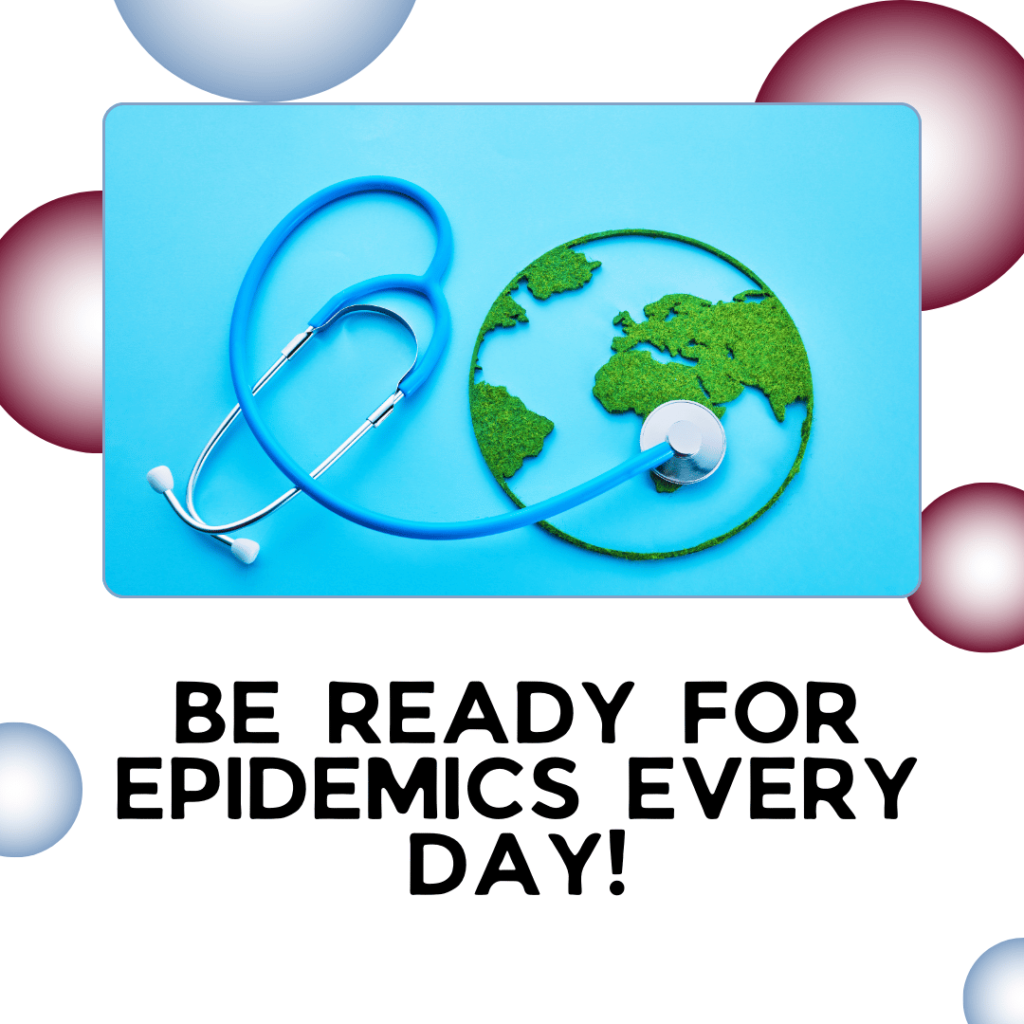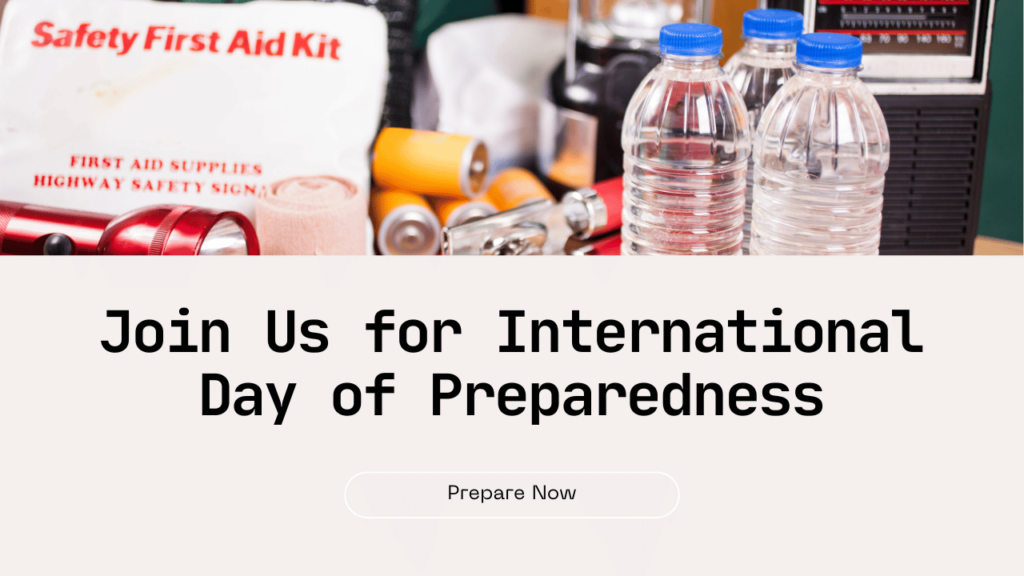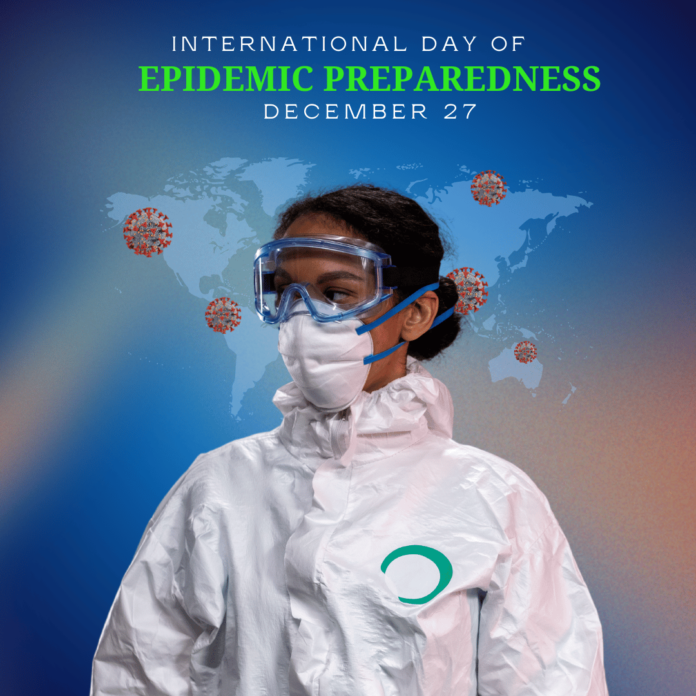When is International Day of Epidemic Preparedness 2024?
The International Day of Epidemic Preparedness 2024 is observed on Friday, December 27th.
Also Read: Boxing Day 2024: Date, History, Importance and Activities
Also Read: Christmas Day 2024: Date, History, Foods, Images, Gifts, Celebration, Best Movies, Ideas and Wishes
Also Read: National Consumer Day 2024: Theme, Date, History, Importance and Activities
Also Read: National Farmers Day 2024: Theme, Date, History, Importance, Activities, Quotes and Wishes
Why is International Day of Epidemic Preparedness celebrated?
The International Day of Epidemic Preparedness is celebrated to highlights the importance of readiness and response to health emergencies, particularly epidemics. By commemorating this day, nations are urged to enhance their capabilities for early detection, prevention, and rapid response to potential health threats, fostering international cooperation and sharing of resources.
What is the history of International Day of Epidemic Preparedness?
The International Day of Epidemic Preparedness, first observed on December 27, 2020, marks a significant global effort to enhance our readiness for future health emergencies. This day was established by the United Nations General Assembly in response to the COVID-19 pandemic. The idea was to raise awareness about the importance of international collaboration and preparedness for epidemics, which have devastating impacts on societies, economies, and health systems worldwide. It serves as a reminder for countries to strengthen their health security frameworks, invest in health systems, and collaborate globally to prevent, detect, and respond to potential outbreaks swiftly.
What are the goals of the International Day of Epidemic Preparedness?

Primary goals of International Day of Epidemic Preparedness are to strengthen global health security, enhance preparedness capabilities, and foster international collaboration. Here’s a breakdown of its key objectives:
- Raising Awareness: One of the main goals is to raise awareness about the impact of epidemics and the importance of being prepared.
- Building Strong Health Systems: Another goal is to encourage countries to build resilient health systems that are capable of quickly detecting, preventing, and responding to outbreaks.
- Fostering International Collaboration: It highlights the importance of sharing information, resources, and expertise across borders. By promoting collaboration among countries, it helps ensure that no nation faces an epidemic alone.
- Enhancing Preparedness Strategies: The day aims to encourage countries to evaluate their current epidemic preparedness strategies and identify areas for improvement. This involves conducting exercises, simulations, and reviews to assess their readiness.
- Promoting Research and Innovation: The day highlights the importance of ongoing research and innovation in epidemic preparedness. It calls for the development of new technologies, vaccines, and treatments to improve responses to outbreaks.
How can individuals prepare for epidemics?
Preparing for epidemics is crucial for individuals to protect themselves and their communities. Following are some practical steps that individuals can take to prepare for an epidemic:
- Stay Informed: This involves regularly checking reliable sources like public health agencies (e.g., the World Health Organization or local health departments) for updates and guidance on emerging infectious diseases.
- Create a Personal Preparedness Plan: Developing a personal preparedness plan is essential. This includes having essential supplies on hand, such as extra medications, non-perishable food, bottled water, and basic household items.
- Practice Good Hygiene: Practicing good hygiene is a fundamental way to protect oneself from infections. This includes regular handwashing with soap and water, using hand sanitizers with at least 60% alcohol, and avoiding touching the face.
- Vaccination: Vaccines help protect individuals from certain infectious diseases and can prevent outbreaks from spreading.
- Build a Support Network: Build a network of family, friends, and neighbors who can provide assistance during emergencies.
- Mental Health Considerations: An outbreak can cause stress and anxiety. Creating a coping strategy—such as maintaining a routine, staying connected with loved ones, and seeking mental health support if needed—is vital for maintaining well-being.
- Know the Signs and Symptoms: Educate yourself about the signs and symptoms of the disease in question. Knowing these early can help individuals seek medical care promptly if symptoms appear.
What role do governments play on the International Day of Epidemic Preparedness?
On the International Day of Epidemic Preparedness, governments play a crucial role in reinforcing their commitment to protecting public health. Here’s how governments contribute to the observance and goals of this day:
- Leadership and Commitment: This includes prioritizing investments in health infrastructure, such as improving disease surveillance systems, emergency response capabilities, and public health laboratories.
- Policy and Strategic Planning: Governments play a pivotal role in developing and updating their national strategies for epidemic preparedness. This involves creating, revising, and implementing policies that address gaps in health security.
- International Collaboration: They can pledge to work closely with international organizations, neighboring countries, and global health networks.
- Public Awareness and Education: Governments are responsible for educating the public about the importance of epidemic, they often lead campaigns to raise awareness about the signs of an outbreak, preventive measures, and the importance of vaccination.
- Resource Allocation and Funding: Governments play a critical role in allocating resources for epidemic preparedness. This includes budgeting for health services, emergency response infrastructure, and public health initiatives.
- Assessment and Accountability: Governments use this day to assess their progress in epidemic preparedness and response. This involves reviewing past outbreaks, identifying weaknesses, and implementing improvements.
What are some key activities or events are held on International Day of Epidemic Preparedness?

The International Day of Epidemic Preparedness is marked by various activities and events that emphasize the importance of being prepared for epidemics. Here’s a breakdown of some key activities and events associated with this day:
- Public Awareness Campaigns: One of the primary activities is public awareness campaigns. Governments, international organizations, and health agencies use this day to educate the public about the importance of epidemic preparedness.
- Workshops and Seminars: Workshops and seminars are common on this day, offering opportunities for health professionals, policymakers, and researchers to discuss the latest developments in epidemic preparedness.
- Exercises and Drills: Governments and organizations conduct preparedness exercises to simulate epidemic scenarios. These drills are crucial for testing response plans, identifying weaknesses, and improving coordination among agencies.
- Policy Announcements and Commitments: On this day, governments often make announcements regarding their commitments to epidemic preparedness. This might include new funding initiatives, policy changes, or enhancements to national preparedness plans.
- Community Engagement Initiatives: Governments and organizations use the day to empower communities with knowledge about epidemic prevention and control.
- Research and Innovation Showcases: These can include demonstrations of new diagnostic technologies, vaccines, and treatments, as well as discussions about advancements in genomics, epidemiology, and public health surveillance.
- Global Dialogues and Webinars: Finally, the day often features global dialogues and webinars where international experts discuss current challenges in epidemic preparedness.
How can communities participate in the International Day of Epidemic Preparedness?
Communities play a vital role in the International Day of Epidemic Preparedness by actively participating in activities that enhance their resilience to epidemics. Here’s how communities can get involved:
- Educate and Raise Awareness: Local organizations, schools, and community leaders can host events like informational sessions, workshops, and public meetings to educate residents about the importance of being prepared for outbreaks.
- Organize Preparedness Drills: Communities can organize preparedness drills to simulate responses to an outbreak. These drills might involve practicing quarantine procedures, emergency communication strategies, and mock vaccination campaigns.
- Create and Maintain Emergency Plans: These plans should cover basic preparedness strategies, such as establishing communication networks, creating neighborhood emergency contacts, and planning for the distribution of emergency supplies.
- Support Local Health Initiatives: This includes getting vaccinated, particularly during outbreaks, to protect not only themselves but also vulnerable members of the community.
- Engage with Local Government and Health Agencies: Communities can engage with these entities by participating in public consultations, attending community meetings, and providing input on local health policies.
- Promote Health Literacy: Communities can support local health campaigns that educate residents on how to recognize and respond to symptoms of infectious diseases, such as fever, cough, and respiratory distress.
How do international organizations like the WHO contribute to this day?
International organizations like the World Health Organization (WHO) play a crucial role in the International Day of Epidemic Preparedness by leading efforts to enhance global health security and support national and local responses to epidemic threats.
- Guidance and Leadership: The WHO provides leadership and technical guidance to countries around the world on epidemic preparedness and response.
- Technical Assistance and Capacity Building: This includes training public health officials, healthcare workers, and other stakeholders on best practices for disease detection, prevention, and control.
- Monitoring and Surveillance: The organization helps establish global early warning systems for epidemic threats, providing countries with timely information about emerging diseases.
- Facilitation of Research and Innovation: WHO facilitates global research and innovation efforts to improve. The organization plays a crucial role in coordinating research initiatives, such as developing new vaccines, diagnostic tools, and treatments.
- Raising Awareness and Advocacy: The WHO raises awareness about the need for international cooperation and solidarity in preparing for and responding to epidemics.
- Collaboration and Partnerships: WHO collaborates with organizations like the World Organization for Animal Health (OIE) to address zoonotic diseases, and with UNICEF to ensure that vaccines are distributed effectively.
- Building a Culture of Preparedness: This involves fostering a shared commitment to health security among governments, organizations, and the public.
What are the challenges faced in epidemic preparedness?
Epidemic preparedness faces several significant challenges that can hinder effective response efforts. These challenges are complex and multi-faceted, requiring coordinated efforts from various stakeholders.
- Resource Constraints: Developing countries often struggle with limited budgets for public health infrastructure, making it difficult to invest in adequate surveillance systems, health facilities, and medical supplies.
- Weak Health Systems: Many countries have weak health systems that are not equipped to handle large-scale epidemics. This includes deficiencies in healthcare infrastructure, lack of access to basic healthcare services, and poor communication systems.
- Limited Surveillance and Early Warning Systems: Challenges include poor data quality, lack of standardized data collection methods, and inadequate integration of information across different sectors. Without reliable early warning systems, it becomes challenging to detect outbreaks in a timely manner.
- Public Awareness and Trust: Public trust is crucial for successful epidemic preparedness and response. Misinformation, stigma, and fear can lead to resistance to public health measures such as vaccination or quarantine.
- Coordination Challenges: Coordination is often a challenge due to fragmented health systems, lack of inter-agency collaboration, and unclear roles and responsibilities.
- Political and Bureaucratic Barriers: Political instability and bureaucratic delays can hinder epidemic preparedness efforts.
- Emerging Infectious Diseases (EIDs): The unpredictability of emerging infectious diseases poses a constant challenge to epidemic preparedness. New diseases can emerge with little warning, requiring quick adaptation and response strategies.
- Global Inequality: Epidemic preparedness efforts are often hampered by global inequalities. Wealthy countries may have better access to advanced medical technologies, vaccines, and treatments, which can lead to disparities in how outbreaks are managed globally.
What are some best practices for countries to adopt for better epidemic preparedness?
To enhance epidemic preparedness, countries can adopt several best practices that improve their ability to detect, respond to, and mitigate outbreaks effectively. Here’s a breakdown of key best practices:
- Strengthening Health Systems: Building resilient health systems is foundational to effective epidemic preparedness. This involves investing in infrastructure such as laboratories, emergency response facilities, and medical supply chains.
- Improving Surveillance and Early Warning Systems: Countries should develop comprehensive, real-time surveillance systems that integrate data from various sources, including hospitals, laboratories, and community health programs.
- Developing Contingency Plans: Every country should have a clear and actionable contingency plan for responding to outbreaks. These plans should include detailed procedures for early detection, rapid response, isolation, and treatment of cases.
- Enhancing Public Awareness and Communication: Countries should implement continuous health education campaigns to inform the public about preventive measures, symptoms, and the importance of early reporting of diseases.
- Ensuring Equitable Access to Resources: Equity is a critical consideration in epidemic preparedness. Countries should ensure that all segments of the population have equal access to healthcare, vaccines, and treatments.
- Promoting International Cooperation: Countries should engage in international cooperation to share information, resources, and lessons learned from previous outbreaks.
- Investing in Research and Innovation: Countries should foster partnerships with research institutions, universities, and the private sector to develop new vaccines, treatments, and diagnostic tools.
- Building a Culture of Preparedness: A culture of preparedness should be ingrained in all levels of government and society. This involves regular training for healthcare workers, simulations of emergency scenarios, and fostering an attitude of readiness among the public.


